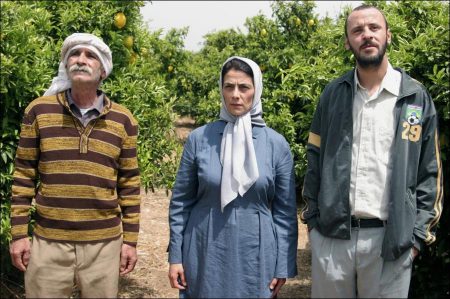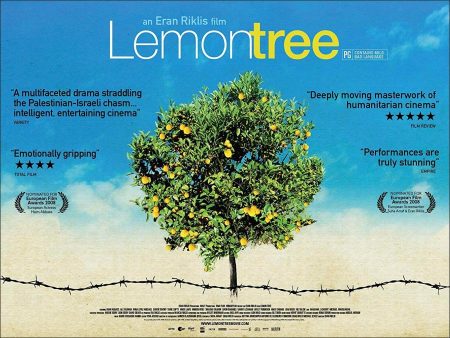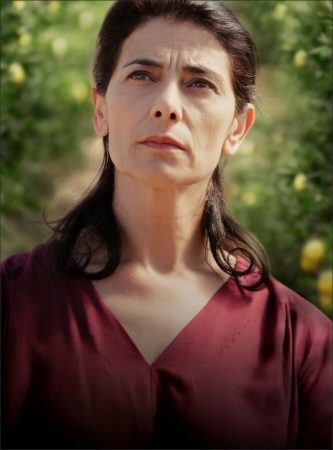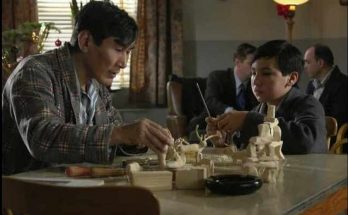Lemon Tree Movie Trailer. When Hiam Abbass, star of the Israeli-made film “Lemon Tree,” stares at the camera, there’s an uncanny resemblance to the haggard but proud woman who appears in Dorothea Lange’s iconic Dust Bowl photograph.
Hiam Abbass plays Salma Zidane, a 45-year-old Palestinian woman desperately trying to hang on to the lemon grove her family has tended for decades, and she acts with perfectly calculated minimalism. A rare smile or tear appears on her painfully severe face with the epic force of a hurricane. As she tells us, she’s suffered a lot in her life — the loss of a husband, the absence of her children, the pain of loneliness and, as director Eran Riklis subtly suggests, the double disempowerment of being a Palestinian among Israelis, and a woman among Palestinians.
And now, with the Israeli defense minister (Doron Tavory) moving in next door, Salma is about to lose her precious lemon grove, which thuggish security agents deem a potential hiding place for terrorists. It is a beautiful spot, lovingly tended, a powerful bond to the land and a precious source of income for poor Salma. Even Mira (Rona Lipaz-Michael), the neglected wife of the minister, considers the order to chop down the trees arbitrary and unnecessary. But the two women live on opposite sides of the Green Line, in different worlds, and Mira’s sympathy from afar can do little to help Salma in her fight.
Based on a real story, “Lemon Tree” explores the painful human detail of life in a society warped from within and without by terrorism. As the television flickers in the background with news of Hezbollah rockets in the north of Israel, Salma is fighting a system forged by fear and suspicion. Powerlessness is felt on both sides. Salma is arguing, vainly, with the legal and military power of a society that treats her as an enemy, and beneath contempt. But the defense minister, and even his sympathetic wife, claim to be powerless as well, unable to change a difficult situation, unable to challenge the expert wisdom of their security forces, unable to change thousands of years of history.
When the composer John Adams wrote his 1991 opera “The Death of Klinghoffer,” which dealt with the Israeli-Palestinian conflict, he opened with a chorus of Palestinians singing about a razed house with a courtyard and a tree “where, on a hot day, one could sit in shade.” Olive trees and lemon trees are powerful symbols, representing two cultures that share a cuisine, that both need sustenance, that both crave the rootedness and dignity of tending something that precedes and outlasts our own brief, mortal visit to the planet. It’s no wonder that trees have been a recurring flash point in this conflict, dire symbols of the idiocy and waste of war.
Riklis has made a powerful film, but can a powerful film change anything about the fatalistic culture of powerlessness that is felt throughout Israel and the West Bank? Or does it merely clothe it in poetic garb, aestheticize it, render it as art, to be savored as something deeply sad and tragic and beyond hope of repair? The irony of “Lemon Tree” is that what it achieves as film — nuance, complexity, ambiguity — only adds, in the end, to the sense that nothing can unravel this mess. That’s a dangerous feeling to leave in your audience, when there are real lives and trees at stake.
According to Box Office Mojo, the film has brought in a total of $6,628,437 worldwide. In the United States, it brought in $569,672 in its seventeen-week run. It premiered on 17 April 2009. The film performed poorly with Israeli audiences despite the positive reaction in other areas. Riklis has said that Israelis have the “false impression” that the film is pro-Palestinian and polemical. The Palestinian reaction has been very positive, according to Riklis.
He expected a far more positive reception in Israel given the success of his previous film, The Syrian Bride, in 2004. The film did receive praise from Hannah Brown of The Jerusalem Post, who stated that “it’s hard to ask for more” and “you will leave the theater craving a glass of the lemonade Salma prepares so lovingly in several scenes”. Haaretz also praised the movie before its release.
Lemon Tree (2008)
Etz Limon
Directed by: Eran Riklis
Starring: Hiam Abbass, Doron Tavory, Ali Suliman, Rona Lipaz-Michael, Tarik Kopty, Amos Lavi, Amnon Wolf, Hili Yalon, Ayelet Robinson, Liron Baranes, Smadar Jaaron
Screenplay by: Suha Arraf, Eran Riklis
Production Design by: Miguel Markin
Cinematography by: Rainer Klausmann
Film Editing by: Tova Asher
Costume Design by: Rona Doron
Music by: Habib Shadah
Distributed by: IFC Films
Release Date: March 27, 2008
Views: 181






